1. Title of the practice
Holistic Development of Students
2. Objectives of the practice
- The mission statement of our institute clearly states that we abide- by ‘To provide high-quality pharmacy education and training to explore the students to be a responsible professional pharmacist’. The following points summarize and state the fundamental objectives in achieving the mission of the institute.
- To help students in improving their skill set
- To keep students motivated in their studies
- To encourage students' achiever orientation through awareness
- To organize many committees and activities into separate clubs
- To persuade students to join various clubs according to their interests
- To improve students' technical proficiency
- 3. The Context
- The institute thoughts that the most effective approach for assuring the overall development of students was to acknowledge and promote their areas of interest. Students from a variety of socioeconomically disadvantaged groups were admitted to the institute. The institute has made some excellent decisions about the general growth of the students in order to make them confident and employable. The college committees organize curricular programs like workshops, seminars, conferences, webinars, and guest lectures, conduct professional visits to hospitals and industries, and coordinate extracurricular activities with students to inoculate self-learning behavior in them. Additionally, a mentoring system introduced at our institutes helps the students at ane individual level to achieve their goals of becoming a holistic and intellectual personality.
- 4. The Practice
- The institute cultivates skills in the students at an individual level and fulfils their needs towards learning behaviour for all-inclusive growth through the followings:
(I) Programs
- Programs such as workshops, seminars, conferences, webinars and guest lectures on different topics such as soft skills, language and communication skills, life skills, ICT and computing skills, career counseling, competitive exams, research methodology, entrepreneurship etc. were organized by the institute supporting the students to acquire the knowledge related to curriculum of the course.
(II) Professional Visits
- Visits to hospitals, pathological laboratories and industries for the students helps them in conceptual clearing by procuring the practical knowledge.
(III) Extension Activities by NSS
- The NSS unit of institute organizes the various special camp and regular activities and motivates the students for active participation. Through the activities like awareness camps, health check-up camps, blood donation camps, social drives, social rallies, street play, surveys, and commemorative day celebrations conducted for the betterment of community, students behave as a responsible citizen and healthcare professional. The activities further enhanced the social and interpersonal skills of the students.
(IV) Intra-mural activities
- Every year, institute organizes annual social function- Spectrum in coordination with faculty/ staff members and students. During Spectrum, various co-curricular activities like scientific oral and poster presentation, and scientific model-making competitions along with extracurricular activities like cultural and sport events were organized for the students to enhance the skill of team and time management amongst the students. Intra-mural activities definitely made the students all-rounder.
(V) Extra-mural activities
- Institute encourages the students to participate in various extra-mural curricular and extracurricular activities.
(VI) Prizes distribution ceremony
- On the concluding day of Spectrum, institute organizes prize distribution ceremony to appreciate the students grabbing the winner and runner-up positions in various co-curricular and extra-curricular activities. Prizes in the form of certificates and trophies motivated the students and enhanced their initiative skills in successful conduct and participation of activities in future. General championship, Runner-Up Trophy, Best Out-Going Students, Best NSS Volunteer, and Prize of Appreciation for Academic Excellence to the students stood first and second in each class were the distinguished awards.
(VII) Guidance for competitive examinations and career counseling
- Institute motivate the students to appear for a variety of competitive exams like GPAT, NIPER, IELTS, MBA and TOEFL. Additionally, GPAT guidance to the students of T. Y. and Final Year B. Pharm. and career counseling was provided in the form of various seminars and guest lectures.
- 5. Evidence of Success
- Better exam scores, more regular attendance, fewer dropouts, higher participation in co-curricular and extracurricular activities, healthy competition in the events, and success on entrance exams are examples of success indicators for the practise. Academic success alone is not necessarily a reliable indicator of a student's holistic growth, thus further proof can be presented, as in the examples below:
- Number of Attendees in Programs
- Attendance can be used as a quick indicator of a student's progress because it correlates with students growing enthusiasm in learning.
- Student’s participation
- Active student participation in NSS extension activities, intra- and extra-mural activities can be viewed as a sign that students are overcoming their prejudices while enhancing skills.
- Student’s achievements:
- Student’s achievements in NSS extension activities, intra- and extra-mural activities might serve as direct indicator of skill progression.
- Success in Entrance exam
The results of entrance exams (like GPAT, NIPER, IELTS, MBA and TOEFL) and the number of students appearing for the same can be viewed as indicator of student’s curricular (academic) growth.
- 6. Problems encountered and Resources
- Initial reluctance of students to participate as a result of uncertainty and fear led to a decline in participation in events and competitions. At initial stage of implementation of practice, it is essential to clear the negative perceptions and anxious behaviour of first year students. Their reluctance was overcome with counselling and inspiration through continuous mentoring. Continuous curricular activities of academic and examination department not only reduces the time available to conduct the activities but also reduces the count of participation. Thus, only few but quality activities were conducted for upgrading the skills at individual level. Further, an impact of COVID-19 pandemic in academic year 2020-2021, restricts social gatherings and reduced the count of activities. During the said period, activities were conducted through virtual (online) mode using Google meet, Zoom, and Google classrooms platforms.
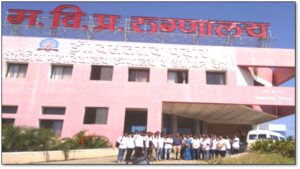 |
Hospital Visit at Dr. Vasantrao Pawar Medical College, Hospital and Research Centre and Blood Bank. 07/11/ 2017 |
| Hospital visit to Teeth care Dental and Surgical Clinic 24/07/2019 |
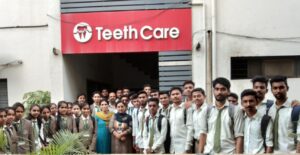 |
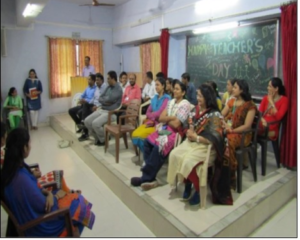 |
Teacher's Day Celebration |
| Students Qualifying GPAT-2020 Exam |
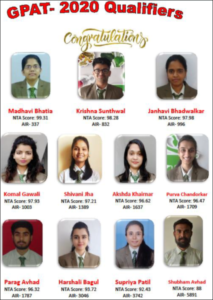 |
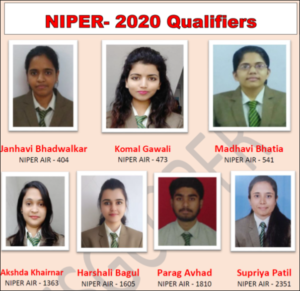 |
Students Qualifying NIPER-2020 Exam |
| Guidance to Entrance Examinations A Seminar on “CONCISE GUIDANCE ON PREPARATION OF GPAT 2020” |
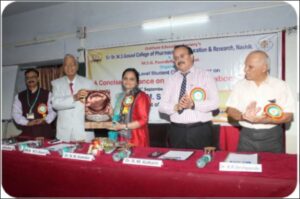 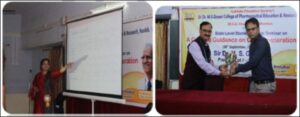 |
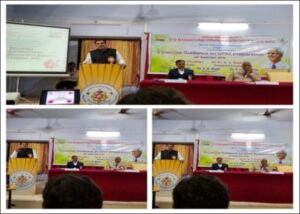 |
Guidance to Entrance Examinations A One day seminar on ‘A CONCISE GUIDANCE ON GPAT-2019’. |
|
Orientation Program for First Year B. Pharm Students (Virtual Mode)
(29/12/2021 to 31/12/2021)
|
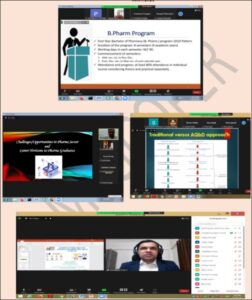 |
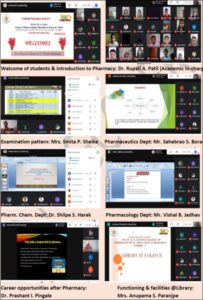 |
One week Induction Program for First Year B. Pharm Students (Virtual Mode)
(30/01/2021 to 04/02/2021)
|
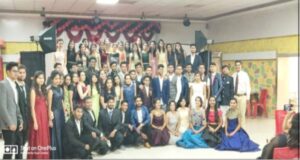 |
OREVWA 2K19- Farewell Party |
| Hasta-La-Vista- Farewell Party (05/04/2018) |
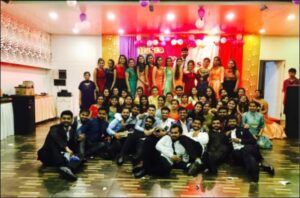 |
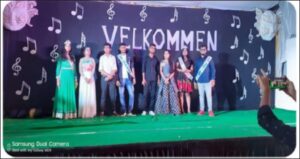
|
VELKOMMEN FRESHERS- Fresher’s Party for F. Y. B. Pharm. and D. Pharm. Students (07/09/2019) |
| BONEVENA FIESTA 2K18- Fresher’s Party for F. Y. B. Pharm. and D. Pharm. Students (08/09/2018) |
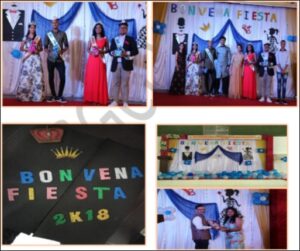 |
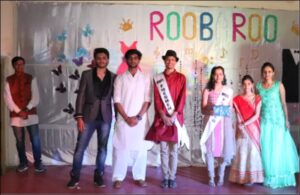 |
ROOBAROO- Fresher’s Party for F. Y. B. Pharm. and D. Pharm. Students (09/09/2017) |
| Industrial Visit At KR Pharma Pvt. Ltd., Dindori |
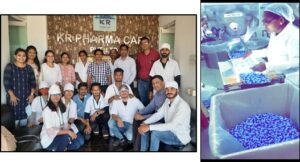 |
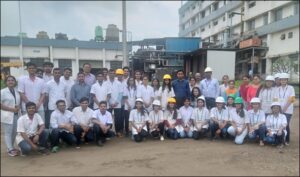 |
Industrial Visit at Vadivarhe Speciality Chemicals Ltd. (VSCL) 27/08/2022 |
| NSS camp |
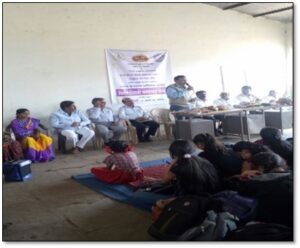 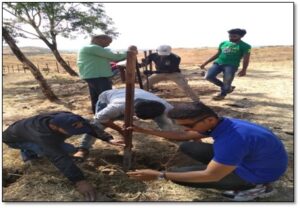 |
- 1. Title of the practice
- Fostering and Maintaining Healthy Life for Society
- 2. Objectives of the practice
- The mission statement of our institute clearly states that we are abide- ‘To provide high quality pharmacy education and training to explore the students to be a responsible professional pharmacist’. Being an essential health-care provider, pharmacist plays a vital role in community services in order to foster and maintain healthy life of people at individual level. The objectives in this line could be stated as follows:
- To arouse the student to work for the welfare of the community.
- To create sounds ground for planning and action towards community service.
- To enhance the involvement of students in the community work.
- To create a sense of cooperation integration and unity among the student.
- To motivate the students to take better participation that would contribute towards in the developing community programs.
- 3. The Context
- WHO promotes the idea of a high-quality life, and as a pharmacy profession, we create pharmacists who are accountable and responsible. Our main social goal is to increase tribal people knowledge and provide services that promote a healthy and fulfilling existence.
- Cultivation of human values in students mind is greatly influenced by their participation in social activities. It increases self-assurance and teaches collaboration and teamwork under the diverse circumstances. Considering the need of current scenario of health-care sectors and disease progression in society, we focused on selecting the activities supporting the community betterment. We promote our students to participate in various activities like health awareness and check-up camps, street play for different communicable diseases, and addictions to make the society conscious. Through oral communication, prior permission from respective authorities were taken for conducting said activities.
- Through extension and outreach activities, students adopt the skill to deal in adverse situations in social life. We also sensitize the students about the importance of social values, responsibilities, and societal issues. We encourage our students to participate in community activities. Students developing interpersonal skills while participating in these activities addition to their curricular aspects. The institute strongly believes that the best way to gain life skills along with the knowledge is by becoming an active member of the society engaging in the community services.
- Our institute has organized a number of outreach initiatives to help and encourage underprivileged members of the community. The activities conducted for fostering and maintaining healthy life for society are organization of health awareness camps focusing the special health issues like tobacco and alcohol addiction, prevalence of malnutrition in children, awareness of ailments like AIDS, leprosy, dengue and malaria, awareness of feminine hygiene during menstruation, social activity at ashram school on the occasion of world tribal day, and health check-up camps for blood group detection, blood pressure measurement, hemoglobin estimation etc.
- Activities Such as ‘Swachh Bharat Abhiyan’ has been organized by the students of our institute. Awareness has also been done through rallies or street plays on world leprosy day, road safety day and pharmacist day. Guest lectures has been conducted on stress management among adolescent girls.
- Environmental promotion activities like plastic free campaign was conducted by the institute during which collection and segregation of plastic garbage was done. During Covid-19 pandemic and lockdown period, the students of our institute distributed face mask and hand sanitizers to underprivileged peoples of society at nearby tribal area of Nasik and make them aware about the impact of COVID 19 pandemic on health, and precautionary measures to be followed such as social distance, hand wash, mask wear, isolation and vaccination etc.
- Activity reports and photographs are considered as success indicator for the practice adopted. Many of tribal community people attend the health check-up camps and acquire knowledge about the health issues. Health related awareness program like rallies and street plays are considered to be the direct indicator of community involvement and benefits.
- 6. Problems encountered and resources required
- Financial assistance for undertaking the activities at community level. Prior sanctioning of budget resolve the problem.
- Coordination at extreme level to conduct large number of activities, can be done by proper distribution of students and teachers coordinators for that said activity.
- Need of full and active participation of tribal community, can be solved by proper guidance to the community.
- Low level of literacy amongst the local population, can be solved by coordinating with local authorities or head of tribal community.
- Barrier of communication with the tribal community, can be solved by coordinating with local authorities or head of tribal community with better understanding skills.
- Initial reluctance, negative perceptions and anxious behaviour of first year students, can be overcome with counselling and encouragement through continuous mentoring.
| Blood donation camp |
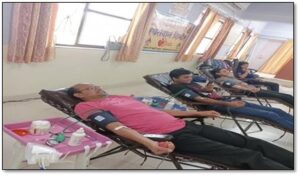 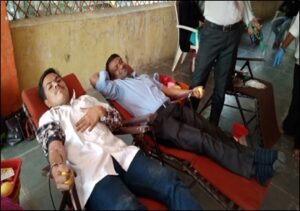 |
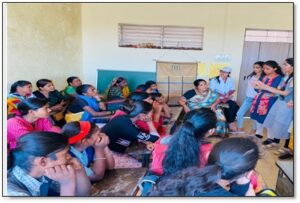 |
Awareness of women and girls of villages about sanitary napkins and hygiene information during menstruation. |
|
Kolhapur Flood Charity
Students of B.Pharm. taken an initiative by sending them essential supplies to people in flood-affected communities.
|
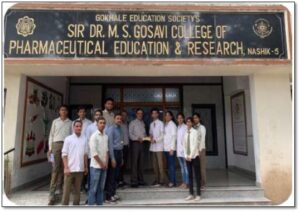 |
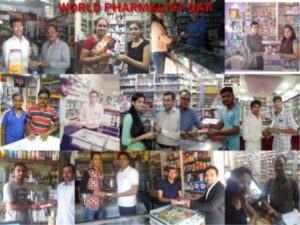 |
Students presenting letters of appreciation to practicing pharmacist in and around Nasik city on occasion of World Pharmacist Day.
|
| On Occasion of Birth Anniversary of Legend Mahatma Gandhi, students were celebrating ‘No Alcohol Day’. |
 |
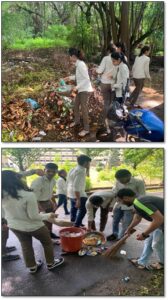 |
Plastic Collection Campaign |
| Eye Checkup Camp |
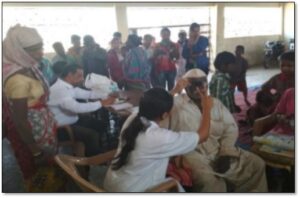 |
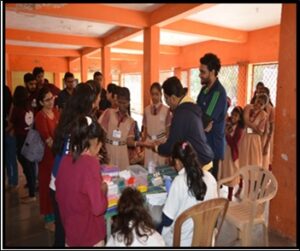 |
Health Checkup Camp |
| hemoglobin/ blood group checkup Camp |
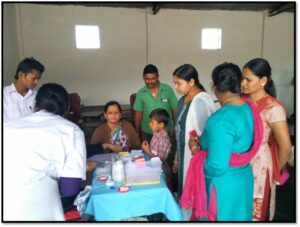 |
- Organizing Students Interpersonal Skills Development Training
- Gokhale Education Society was established in 1918. Our Society is as a pioneering institution in the category of self-financed institutions under the auspices of an established and well-respected organization. GES’s Sir Dr. M.S. Gosavi College of Pharmaceutical Education and Research, Nashik is acknowledged as recognized pharmacy institute for its outstanding effort building society health in remote tribal and rural areas, and providing high-quality education. The institute is dedicated to fostering society's health and well-being by developing skilled and ambitious pharmacists. The institute’s vision is to excel in pharmaceutical education and technology. The mission of institute is to provide high quality pharmacy education and training to explore the students to be a responsible professional pharmacist.
- Employers look for skills and attributes in two general categories: defining skills (technical skills) and enabling skills (soft skills). Our institute adheres to the philosophy that students are the most important and crucial stakeholder of the society. Institute take all the necessary efforts to make our students professionally and socially competent. Every year, students from diverse socio-economic and academic backgrounds join our institute.
- According to employer feedback, reports of skill India and the national educational policy (NEP) 2020, the transition of the market from a learning-centric approach to a skill-based model has been a courageous footstep that has revolutionized the education system of India. In according to the need of transforming India, students needed special support in the developing interpersonal skills to become technically competent and employable to fulfil the requirement of demanding society. Keeping this in view, institute organizing Student Interpersonal Skills Development Training Programs.
- Following are the initiatives taken by the institute to develop interpersonal skills:
- Soft Skills
- Students are trained by intercollege professors and professional trainers to develop their talents and establish a career path through in-depth aptitude training sessions, group discussions, personal interviewing techniques, resume writing skills, corporate etiquette, and e-networking, among other approaches. Personal interview sessions that focus on personality development were also held. These sessions covered topics including clothes and dress codes, greetings, gestures, postures, confidence, and preparing for expected questions.
- Communication Skill & English language Improvement
- The institute took an initiative to improve communication skills and English language proficiency after recognizing a need among the local population. To this end, professional trainers with extensive experience in developing the communication skills and teaching the English language were invited.
- Institute implement modules for first- to fourth-year students in accordance with their needs, and carry out ongoing program introductions all year around. Language teachers designed resources to match their needs and curriculum, and text, images, audio, and video may all be simply incorporated into language teaching and learning. Students record their own voices, listen to the recordings, and interact with the teacher and other students while documenting their work and recordings.
- Teachers supervise students' work from the teacher console, step in when necessary, and manage the computers that the students use. Self-access resources are those that can be accessed for independent learning outside of the classroom. Students will develop strong English communication skills and personality traits that are essential for their future plans and career requirements.
- The students' improved English language skills helped them in a variety of contexts, including helping them with theory exams, practical viva-voices, job interviews, and professional life.
- Add on Training workshops and programs:
- The students receive thorough instruction and preparation to ensure that they are knowledgeable about current market trends, leadership/teamwork skills, and entrepreneurial potential. In order to inspire students to develop their entrepreneurial skills, college conduct entrepreneurship awareness camps through expert talks by successful business owners and industry professionals. Guidance and counselling sessions on the GPAT, GRE, CAT, CMAT, and TOFEL are conducted for students who are interested in taking advantage of multiple opportunities for their higher education. Also college is arranging the hands on training on sophisticated Instruments which are used in pharmaceutical research and development. After successfully completing the training, the students receive their certification for participation.
- College Infrastructure
- Our institute provided infrastructure that complies with AICTE and PCI norms to enhance it in response to development and expansion. Since its inception, the institute has upheld high standards for infrastructure to meet demands from industry and regulatory bodies with a built-up area of 3609.27 square meters in accordance with statutory bodies.
- Center Location in City
- In the heart of Nasik City, on well-known College Road, at Prin. T. A. Kulkarni Vidyanagar, our Institute is located. Student can more easily access public transport is available to reach the institute. Students belongs to remote area can uses City Link city bus facility which is very economical.
- Alumni
- Although our alumni association is not registered yet, our institute arranges alumni meet every year. Students those who are alumni of this college are actively gathering for meeting. Alumni meet offer networking opportunities, connect recent graduates with established professionals and help people to pursue career. Alumni offer support to the students through interaction, guidance and placement assistance.
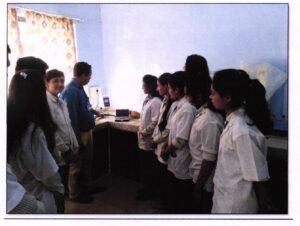 |
Hands on Training Session on Brookfield Viscometer |
| Hands on Training Session on pH meter |
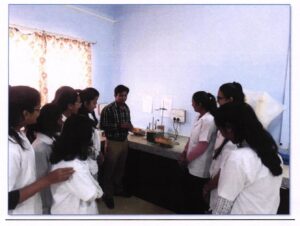 |
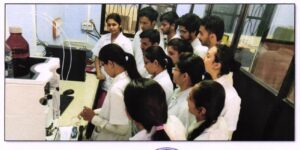 |
Hands on Training Session on High Performance Liquid Chromatography (HPLC) |
| Hands on Training Session on Soxhlet Apparatus |
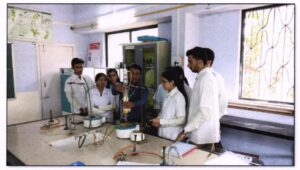 |

































